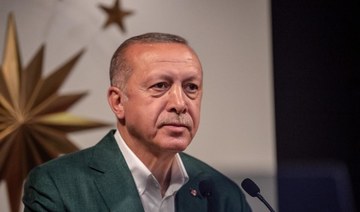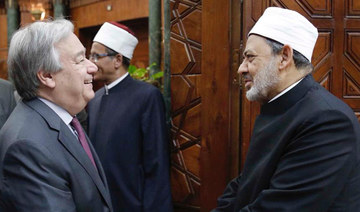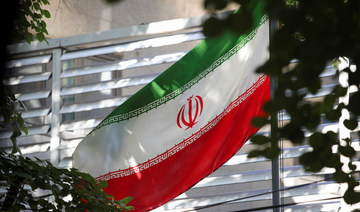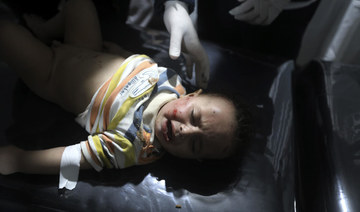ANKARA: Following losses in key cities this year, Turkish President Recep Tayyip Erdogan now risks losing more voters as former allies stick their head above the parapet and appear to be on the verge of creating new parties.
Former prime minister Ahmet Davutoglu and ex-economy minister Ali Babacan have both made statements this month criticizing Turkey’s current trajectory under Erdogan.
Rumors have swirled in Ankara for months that Babacan and Davutoglu may establish their own political parties to challenge the Islamic-rooted AKP that has dominated Turkish politics this century.
On July 8, Babacan, who is credited with overseeing Turkey’s economic boom during the AKP’s first decade in power, dealt the first blow when he resigned from the party.
He claimed Turkey needed a “new vision” and cited “deep differences” over policy, hinting a new party — or “new effort” — was “inevitable.”
With double-digit inflation, slower growth and a weakened lira, many hope Babacan will be the answer to Turkey’s economic woes and an alternative to Erdogan.
Ten days after Babacan, Davutoglu gave an interview broadcast live online in which he appeared to suggest he would be ready to set up a new party.
Erdogan has downplayed the threat but also warned Babacan against splitting the “ummah” — using the Arabic word for the Muslim community.
Experts say the president will not quietly accept these challenges.
“Erdogan is likely to combat any threat he sees to his personalized rule,” said Lisel Hintz, assistant professor of international relations at Johns Hopkins University.
She pointed to the jailing of Kurdish leader Selahattin Demirtas who had vehemently opposed Erdogan, and the ongoing trials of civil society leaders and AKP opponents.
Turkey has been to the polls eight times in just five years, but now any new party will have potentially until the next elections in 2023 to create momentum and attract voters.
When he announced he was standing down as prime minister in 2016 after two years, Davutoglu vowed never to criticize Erdogan in public.
That promise lay in tatters this week as he spoke online for three hours, saying he would remain within the AKP for now, but that: “If there is no other option, a (new) party must be set up.”
For now, it appears unlikely that Davutoglu will join forces with other splitters from the AKP, having been a fairly divisive figure himself in the past.
However, there have been reports that former president and co-founder of the AKP, Abdullah Gul, could act as an “honorary chairman” to a party led by Babacan.
It had been mooted that Gul would run against Erdogan in last year’s presidential elections, but he never came forward.
Erdogan criticized Babacan after his resignation, saying they disagreed over many issues, including interest rates, which the president controversially believes must be kept low to reduce inflation.
When asked if he was disappointed by Babacan, Davutoglu and Gul, Erdogan responded with evident exasperation: “For the love of Allah, should this question be asked? If one is not disappointed with them, who would one be disappointed with?”
But he said previous MPs had left the party and been largely forgotten.
The AKP came to power after the Turkish economy suffered a severe financial crisis in 2001, and needed an International Monetary Fund loan to emerge from the embers.
Eighteen years later, Turkey is again in an economic slump.
Inflation is at 15.7 percent; the rate of unemployment is 13 percent while the economy contracted by 2.6 percent in the first quarter of 2019.
According to Hintz, the success of any party launched by Babacan will “likely depend on the extent to which it offers concrete plans for tackling Turkey’s economic problems and social divides.”
She added that Babacan had a “shot at galvanizing Turkey’s center-right, particularly given widespread disillusion surrounding the personal enrichment of AKP leaders while Turkey’s economy slides further toward crisis.”
Erdogan and the AKP, set up in 2001, have won every general election since coming to power in 2002.
But after 25 years of the AKP and its predecessors running Istanbul, the country’s economic powerhouse is now in the hands of the opposition, despite a controversial push by the ruling party to order a re-run of the vote.
Erdogan still commands widespread loyalty, particularly in the provinces, said Emre Erdogan, professor of political science at Istanbul Bilgi University, and no relation to the president.
But he said any new challenger could be “destructive” to Erdogan’s chances at the next election, given that presidential candidates must win over 50 percent of the vote.
Turkish leader Recep Tayyip Erdogan faces new threat from former allies
Turkish leader Recep Tayyip Erdogan faces new threat from former allies

- Former prime minister Ahmet Davutoglu and ex-economy minister Ali Babacan have both made statements this month criticizing Turkey’s current trajectory
- Turkish President Recep Tayyip Erdogan has downplayed the threat
Al-Azhar Al-Sharif condemns terrorist crimes against civilians in Gaza
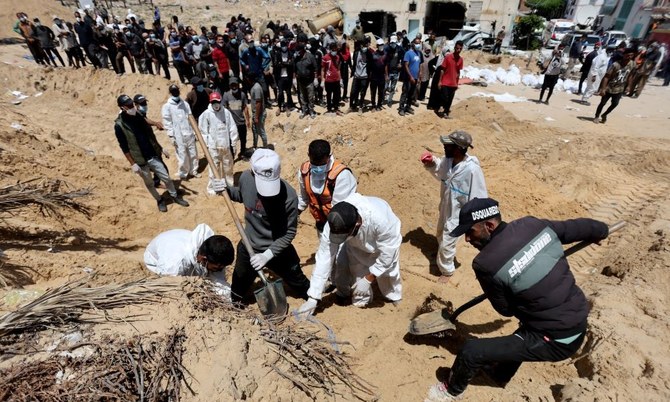
- Al-Azhar Al-Sharif reiterated the need for the international community to assume its responsibilities and put a stop to the “frenzied aggression against the people of Gaza”
- Al-Azhar said that the bodies of hundreds of Palestinians, including patients, had been uncovered in mass graves at the Nasser Medical Complex in Khan Younis
CAIRO: Al-Azhar Al-Sharif — Sunni Islam’s oldest and foremost seat of learning — has strongly condemned “the terrorist crimes being committed against civilians in the Gaza Strip.”
In a statement, Al-Azhar censured the attacks, “the hideousness of which was revealed through the widespread reports about mass graves of hundreds of bodies of children, women, the elderly, and medical personnel in the vicinity of the Nasser and Al-Shifa Medical Complexes.
“Also, dozens of bodies were found “scattered” in shelter and displacement centers and tents, and residential neighborhoods throughout the Strip.”
Al-Azhar said that it affirmed to the world that “these mass graves are the definitive proof that these hideous atrocities and horrors have become normal daily behavior for Israel.”
It said that the people of the world must unite to protest in a way that deterred the regimes supporting these crimes.
Al-Azhar demanded an urgent international trial against “the terrorist occupation government, which no longer knows the meaning of humanity or the right to life and is committing genocides every day.”
It reiterated the need for the international community to assume its responsibilities, stop the “frenzied aggression against the people of Gaza and the consequent suffering and unprecedented humanitarian disasters, and ensure the protection of civilians and the delivery of sufficient and sustainable humanitarian aid to all parts of the Gaza Strip.”
Al-Azhar expressed its “sincere condolences and sympathy to the Palestinian people and the families of the martyrs, calling on the Lord Almighty to shower them with His vast mercy and forgiveness, to reassure the hearts of their families and loved ones, and to speed up the recovery of the sick.”
Citing media reports, Al-Azhar said that the bodies of hundreds of Palestinians, including patients, had been uncovered in mass graves at the Nasser Medical Complex in Khan Younis since Saturday.
New UK sanctions target Iranian drone industry
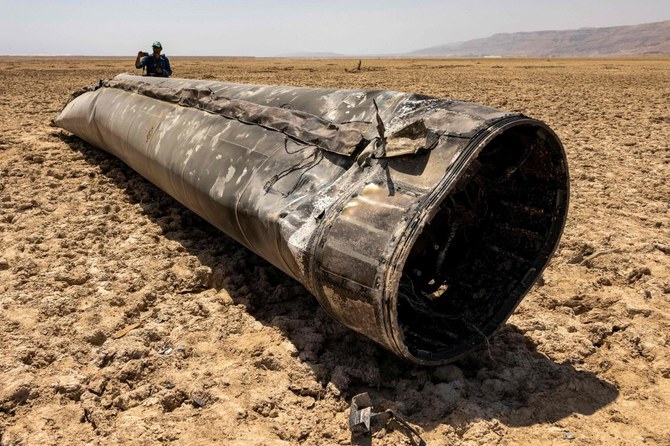
- The measures, taken in co-ordination with the US and Canada, target four businesses and two directors at a network of drone companies
LONDON: Britain on Thursday announced new sanctions targeting Iran’s military drone industry, in response to Iran’s drone and missile attack on Israel earlier this month.
The measures, taken in co-ordination with the US and Canada, target four businesses and two directors at a network of drone companies with the aim of limiting Iran’s ability to launch drones.
“The Iranian regime’s dangerous attack on Israel risked thousands of civilian casualties and wider escalation in the region,” British Foreign Secretary David Cameron said in a statement.
“Today the UK and our partners have sent a clear message – we will hold those responsible for Iran’s destabilising behavior to account.”
Britain also said it would introduce new bans on the export of drone and missile components to Iran, seeking to limit its military capabilities.
Last week, Britain imposed sanctions on Iranian military figures and organizations, in another coordinated move with the United States, following Iran’s action against Israel.
Iran launched drones and fired missiles at Israel on April 13 as a retaliatory strike for the attack on its embassy compound in Damascus two weeks prior, raising the risk of further escalation in conflict in the Middle East.
Egypt, Dutch leaders discuss Gaza ceasefire efforts

- Rafah assault ‘will have catastrophic consequences on regional peace and security,’ El-Sisi warns
- Egypt’s president and the Dutch prime minister agreed on the urgency of working toward reaching a ceasefire
CAIRO: Egypt’s President Abdel Fattah El-Sisi has discussed efforts to reach a ceasefire in Gaza with Mark Rutte, prime minister of the Netherlands.
During a phone call from Rutte on Thursday, the Egyptian leader warned that any Israeli assault on Rafah will have “catastrophic consequences” for the humanitarian situation in the enclave.
The leaders discussed bilateral relations, and ways to enhance cooperation across various political and economic levels consistent with the current momentum in Egyptian-European relations.
Ahmed Fahmy, presidential spokesman, said the call also focused on the situation in Gaza, and Egypt’s efforts to restore regional stability by reaching a ceasefire and providing access to humanitarian aid.
El-Sisi reiterated the crucial importance of ending the war, warning against any military operations in the Palestinian city of Rafah, which will have catastrophic consequences on the humanitarian situation in the strip and on regional peace and security.
The Egyptian leader underscored the need for the international community to assume its responsibilities to implement the relevant UN resolutions.
Egypt’s president and the Dutch prime minister agreed on the urgency of working toward reaching a ceasefire, and ensuring the flow of adequate humanitarian aid to all areas of the Gaza Strip in order to protect it from a humanitarian catastrophe.
They also emphasized the need to move toward implementing the two-state solution, which would restore regional stability, and establish security and peace in the region.
In March, El-Sisi received Rutte to discuss bilateral relations, regional developments, and Egypt’s efforts to reach a ceasefire and offer humanitarian assistance in Gaza.
Lebanon postpones local elections again as violence rocks south

- Lebanon is supposed to hold municipal elections every six years
- Parliament approved “extending the existing municipal and elective councils’ mandate until a date no later than May 31, 2025,” despite objections from lawmakers opposed to Hezbollah
BEIRUT: Lebanon’s parliament on Thursday delayed municipal elections for a third time in two years, state media reported, as militants in the country’s south exchanged near-daily fire with Israel for over six months.
The powerful Iran-backed Hezbollah group has been trading fire with Israeli forces across the border since the day after its Palestinian ally Hamas carried out a deadly attack on Israel on October 7, triggering the ongoing war in the Gaza Strip.
Lebanon is supposed to hold municipal elections every six years, but cash-strapped authorities last held a local ballot in 2016.
Parliament approved “extending the existing municipal and elective councils’ mandate until a date no later than May 31, 2025,” despite objections from lawmakers opposed to Hezbollah, said the official National News Agency.
The bill cited “complex security, military and political circumstances following the Israeli aggression on Lebanon” and especially its south, near the border, as reasons for the delay.
Lawmakers did not set a new date for the elections, initially scheduled for 2022.
Local councils help provide basic services to residents, but their role has declined as state coffers ran dry after Lebanon’s economy collapsed in late 2019.
Parliament Speaker Nabih Berri had previously said southern Lebanon could not be excluded from any upcoming ballot, after the Christian Lebanese Forces, the main party opposing Hezbollah, insisted on holding the polls on time.
More than 92,000 people have been displaced from their homes in Lebanon due to the violence, as have tens of thousands of residents of Israeli communities across the border.
Since violence began along the Israeli border on October 8, at least 380 people have been killed in Lebanon, including 72 civilians, according to an AFP tally.
Israel says 11 soldiers and eight civilians have been killed on its side of the border.
In April 2023, the Lebanese parliament had already postponed municipal elections as the deputy speaker warned holding them was “almost impossible” for the cash-strapped country after years of economic meltdown.
Lebanon has faced the prolonged financial crisis and months of border clashes essentially leaderless, without a president and headed by a caretaker government with limited powers amid deadlock between entrenched political barons.
Palestinian officials say Israeli forces kill teen in West Bank
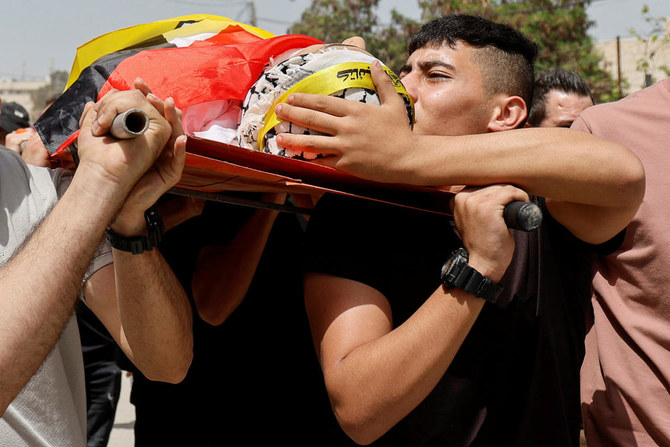
- Israeli police said “hits were identified” when forces responded to stone-throwing with gunfire
- The Palestinian health ministry said Khaled Raed Arouq was shot in the chest and “martyred by the occupation’s live bullets“
RAMALLAH, Palestinian Territories: Palestinian officials said Israeli forces killed a 16-year-old boy during a raid in the West Bank city of Ramallah early on Thursday.
Israeli police said “hits were identified” when forces responded to stone-throwing with gunfire but did not directly address the allegation.
The Palestinian health ministry said Khaled Raed Arouq was shot in the chest and “martyred by the occupation’s live bullets.”
Palestinian official news agency Wafa said Arouq died after being “shot by Israeli gunfire” early on Thursday morning.
Israeli forces carry out regular raids on towns and cities in the occupied West Bank and violence has soared in the Palestinian territory since the war in Gaza broke out on October 7.
Wafa said Israeli military vehicles stormed the city and “confrontations broke out between citizens and the occupation forces, who fired live bullets and stun grenades.”
It said Israeli forces were stationed in several neighborhoods and raided a house in Al-Bireh to the northeast.
Israeli police said: “Terrorists threw stones at the forces operating in the area, the forces responded with gunfire, and hits were identified.”
The police said they made several arrests and that Israeli forces did not suffer any casualties.
The army did not immediately respond to AFP’s request for comment.
Later on, Thursday, mourners carried Arouq’s body wrapped in the flag of Fatah, the political party of Palestinian president Mahmud Abbas, in his hometown of Jenin where he was buried.
“He was hit by a bullet in his back, which exited through his chest...They assassinated him in cold blood,” Majed Arqawi, cousin of Arouq, told AFP.
Wafa said Arouq’s father was an officer in the Palestinian military intelligence service.
Israel has occupied the West Bank since 1967 and at least 488 Palestinians have been killed by Israeli troops or settlers there since October 7, according to Palestinian officials.
At least 19 Israelis have been killed in attacks by Palestinians in the same period, according to official Israeli figures.



